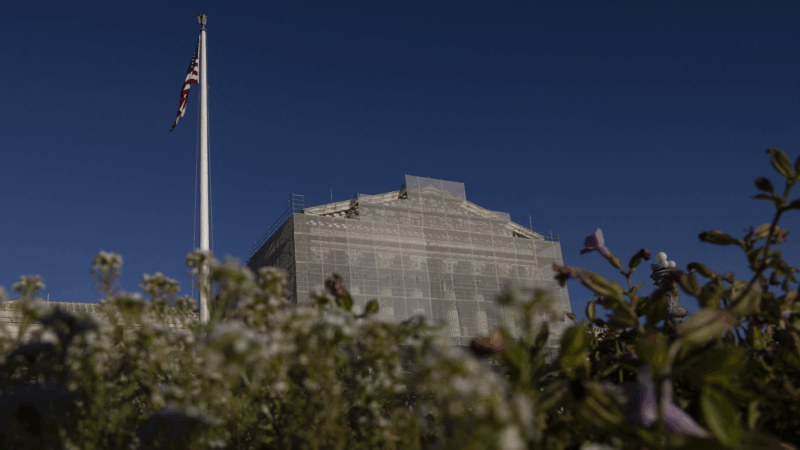At the Supreme Court, the case of the candidate who sued, even though he won
At the Supreme Court on Wednesday, conservative and liberal justices alike appeared to have little use for either side in a case that tests Illinois voting regulations. The often fractious justices teamed up to have a bit of fun at the expense of two seasoned advocates.
At issue was a suit by Rep. Michael Bost, R-Ill., challenging the constitutionality of an Illinois regulation that allows ballots mailed in by Election Day to be counted for up to 14 days after polls close. The lower courts ruled against Bost after finding that he failed to show he was individually harmed by the ballot regulation since he won.
Representing Bost, former U.S. Solicitor General Paul Clement contended that Bost was harmed by the mail-in ballots because they lowered his margin of victory and because he had to pay staffers during the two week vote count. But Chief Justice John Roberts and Justice Elena Kagan were not buying it. Bost’s arguments, Roberts said, boiled down to “Hi, I’m a candidate. These rules apply to me, and I’m suing.”
Justice Samuel Alito piled on, telling Bost’s lawyer, “It’s not clear to me why you couldn’t have done a lot better than you did in your complaint and alleged what I think a lot of people believe to be true, which is that loosening the rules for counting votes like this generally hurts Republican candidates, generally helps Democratic candidates.”
Justice Sonia Sotomayor followed up, pointing out the Bost brief “didn’t even track our legal language. You didn’t put in any facts.”
When the justices asked whether candidates with no real chance of winning an election should still automatically be able to sue, Clement replied with what was perhaps a tongue-in-cheek statement: “I’m going to stand with the 2% candidate. I stand in locked shoulder with the Socialist Workers Party” and other candidates who get very few votes.
“Those are interesting bedfellows you’re taking,” observed Sotomayor. Justice Neil Gorsuch seemed to agree, noting that in a prior Socialist Workers Party case, “Boy, they had zero chance of winning the election, zero chance.”
Next up to the lectern was Illinois Solicitor General Jane Notz, who started out by describing how, under Bost’s preferred rule, “Any self-declared candidate could challenge any election rule that they happen to have a policy disagreement with, even if that rule were entirely harmless.”
But she quickly ran into trouble, arguing that only candidates with a chance of winning the election can sue.
“What you’re sketching out for us is a potential disaster,” replied Chief Justice Roberts.
Alito asked if Notz was “seriously arguing that whether or not the allegations here are sufficient requires an analysis of the particular background and experience of the candidate who files the complaint?”
Gorsuch questioned whether there was “something unseemly about federal courts making prognostications about a candidate’s chance of success immediately before an election. Thoughts?”
And both Justices Brett Kavanaugh and Ketanji Brown Jackson seemed to be in agreement that Illinois was “walking away” from arguments laid out in its own brief. Of course, said Kavanaugh, “That’s your choice.”
In this Icelandic drama, a couple quietly drifts apart
Icelandic director Hlynur Pálmason weaves scenes of quiet domestic life against the backdrop of an arresting landscape in his newest film.
After the Fall: How Olympic figure skaters soar after stumbling on the ice
Olympic figure skating is often seems to take athletes to the very edge of perfection, but even the greatest stumble and fall. How do they pull themselves together again on the biggest world stage? Toughness, poise and practice.
They’re cured of leprosy. Why do they still live in leprosy colonies?
Leprosy is one of the least contagious diseases around — and perhaps one of the most misunderstood. The colonies are relics of a not-too-distant past when those diagnosed with leprosy were exiled.
This season, ‘The Pitt’ is about what doesn’t happen in one day
The first season of The Pitt was about acute problems. The second is about chronic ones.
Lindsey Vonn is set to ski the Olympic downhill race with a torn ACL. How?
An ACL tear would keep almost any other athlete from competing -- but not Lindsey Vonn, the 41-year-old superstar skier who is determined to cap off an incredible comeback from retirement with one last shot at an Olympic medal.
Trump promised a crypto revolution. So why is bitcoin crashing?
Trump got elected promising to usher in a crypto revolution. More than a year later, bitcoin's price has come tumbling down. What happened?







